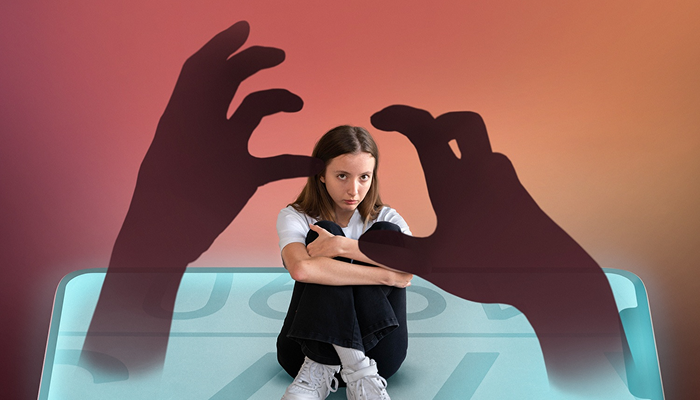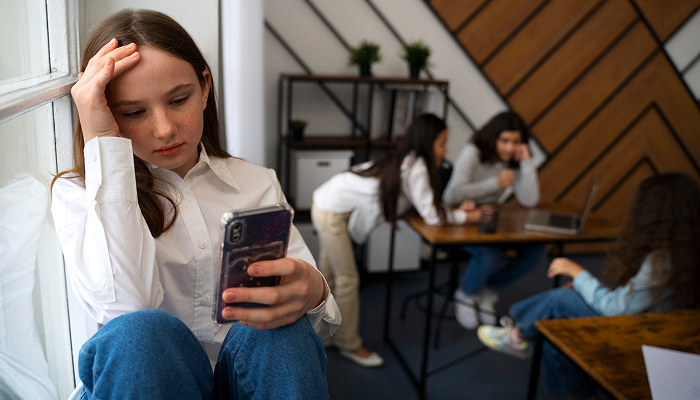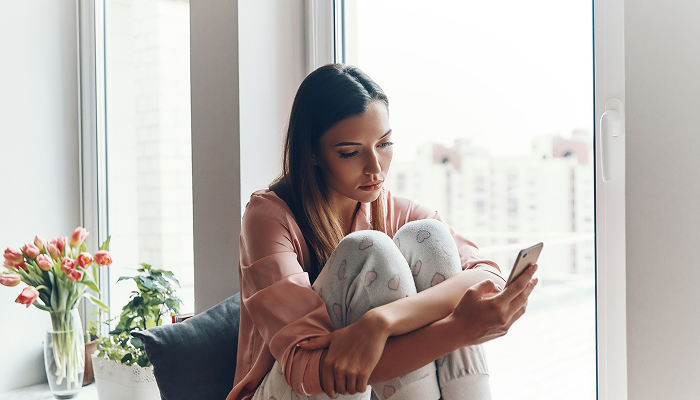You’re in bed, scrolling through TikTok late at night, and you land on a video where someone describes feeling scattered, overwhelmed, or inexplicably sad… Feelings that hit close to home. Before you know it, you’re deep in a rabbit hole of relatable content, story times, POVs, memes, wondering if you’ve just diagnosed yourself with a mental health condition.
This scenario is increasingly common, especially among Gen Z and Millennials, as social media platforms like TikTok and Instagram become go-to sources for mental health insights. With hashtags like #bipolar and #depression racking up billions of views, these platforms are shaping a new culture of self-diagnosis. But is this trend toward self-diagnosis empowering or risky?
In this article, we’re diving into the pros, cons, and next steps for navigating this digital mental health landscape.
What Is Self-Diagnosis via Social Media?
Self-diagnosis via social media refers to individuals identifying mental health conditions based on content they encounter online. Often, this self-diagnosis is made without consulting a healthcare professional. Platforms like TikTok, Instagram, and YouTube have become hubs for mental health discussions, where creators—some credentialed, many not—share videos, memes, and posts about symptoms of anxiety, depression, ADHD, and more. This 2022 report found that:
- 25% of young people have self-diagnosed based on social media content, with Gen Z leading the charge,
- 30% of whom have used platforms like TikTok for this purpose.
It’s important to remember that social media platforms use algorithms to show more relatable content. This, in turn, can create a cycle that strengthens users’ beliefs about their mental health. While sparking curiosity, it also raises concerns about accuracy and the potential for misdiagnosis.

Risks of Self-Diagnosis on Social Media
There are significant risks when self-diagnosing. While,social media can be a powerful tool for awareness, information and education, – diagnosing a mental health condition based on social media content comes with significant risks that can impact mental health and well-being. Below are some key concerns:
| Risks | Impact | Example |
| Misinformation & Oversimplification | Social media content often lacks the nuance needed to accurately represent complex mental health conditions. Short-form videos may oversimplify symptoms, leading to incorrect self-diagnoses. | Normal feelings of sadness or distraction can be mistaken for depression or ADHD, as noted in this 2025 study of youth entering mental health treatment. |
| Romanticizing Mental Illness | A troubling trend, particularly among Gen Z, is the glorification of mental health struggles. This romanticization can blur the line between universal emotions and clinical disorders, potentially trivializing genuine struggles. | Characters like the Joker or Patrick Bateman from American Psycho are celebrated in meme culture, turning serious conditions into aesthetic or desirable traits. |
| Confirmation Bias & Echo Chambers | Social media algorithms feed users content that aligns with their interests, creating feedback loops. This can delay professional help, as seen in cases where 73% of young adults in the aforementioned 2025 study. | If someone suspects they have anxiety, they’re likely to see more anxiety-related posts, reinforcing their belief, whether accurate or not. |
| Health Anxiety & Delayed Treatment | Constant exposure to mental health content on social media can heighten fears of having various conditions, increasing stress & potentially worsening symptoms by delaying proper care. | If someone watches a lot of content on intrusive thoughts, they’re likely to worry excessively that they have OCD, heightening their stress or complicated feelings of shame and isolation. |
| Inaccurate Self-Management | Some individuals begin medication or treatment based on self-diagnosis without consulting professionals, as 32% of respondents in a Tebra survey reported doing. | Buying stimulants online without a prescription after self-diagnosing with ADHD, only to later discover one’s symptoms were caused by sleep deprivation and stress. |
Benefits of Social Media for Mental Health
Despite the risks, social media offers significant benefits when used responsibly. These platforms have revolutionized how we approach mental health, particularly for younger generations.
| Benefit | Impact | Example |
| Increased Mental Health Awareness | TikTok and Instagram have sparked curiosity about mental health, helping users recognize symptoms they might otherwise ignore. | Relatable content about anxiety or depression has motivated many to explore their mental health, with 72% of survey respondents noting increased awareness as a key benefit. |
| Destigmatization of Mental Health | By normalizing conversations about mental health, social media reduces shame and encourages help-seeking behavior. | Platforms like Instagram can foster open discussions, making it easier for individuals to discuss their struggles without fear of judgment. |
| Community Connection & Support | Social media connects users with supportive communities, offering validation and a sense of belonging. | TikTok communities provide encouragement for those exploring their mental health, with 38% of survey respondents valuing the empathy fostered online. |
| Encouraging Early Detection | Engaging with mental health content can prompt individuals to seek professional help sooner. | After seeing a therapist’s Instagram post on signs of social anxiety like avoidance, specific physical symptoms, and post-event rumination – they realize their experiences align and seek out professional help. |
What to Do Next: From Social Media Awareness to Professional Evaluation and Treatment
If social media has sparked curiosity about your mental health, that’s a great starting point—but it’s not the finish line. Here’s how to move forward responsibly:
TIP 1: Use Social Media as a Spark, Not a Diagnosis:
Treat online content as a way to explore your feelings, not as a definitive answer. Verify information by checking creators’ credentials and prioritizing evidence-based sources over anecdotal stories.
TIP 2: Limit Screen Time:
Limit bedtime procrastination and reduce exposure to negative feedback loops, like doom-scrolling, which can amplify health anxiety. Try your best to balance online time with offline activities like hobbies or social interactions.
TIP 3: Engage Critically:
Be wary of oversimplified solutions or quick fixes. For example, avoid videos promising “5 signs you have OCD” without clinical backing. Instead, seek content from licensed professionals or reputable organizations.
TIP 4: Seek Professional Help:
A licensed mental health professional can provide an accurate diagnosis and tailored treatment plan. Remarkably, 82% of those who sought a second opinion after self-diagnosing had their suspicions confirmed, highlighting the value of professional input.
Contact Us Today
If you relate to the mental health content you’ve seen online, don’t stop at self-diagnosis. Take the next step toward clarity and healing by consulting a professional.
Our team of licensed psychiatrists and therapists is here to provide evidence-based evaluations and personalized care. Whether you’re exploring symptoms of anxiety, depression, or another condition, we’re committed to helping you navigate your mental health journey with compassion and expertise.
Contact us here to schedule an appointment and start building a healthier, more balanced you. Your mental health matters – let us help you move beyond the scroll.



